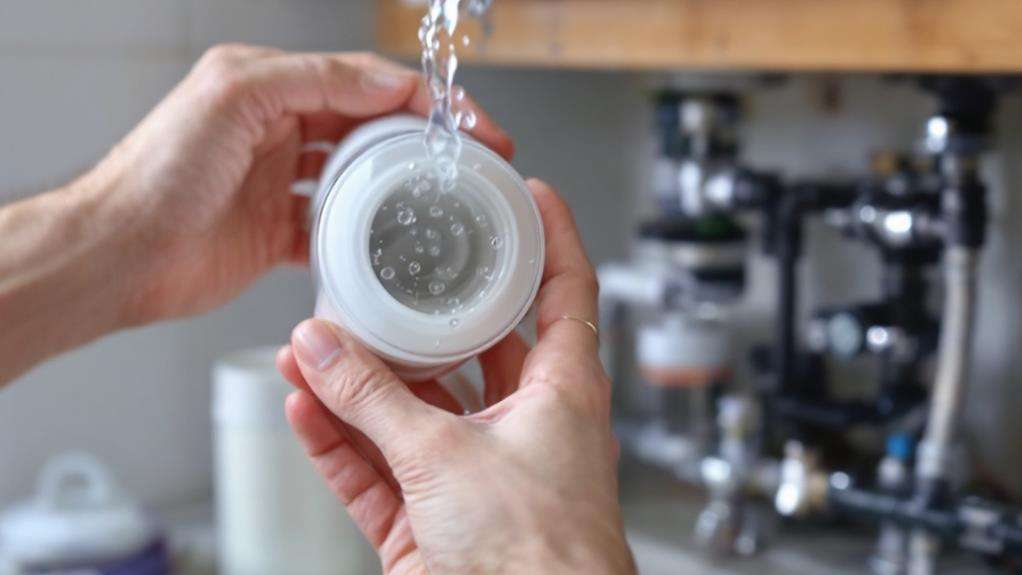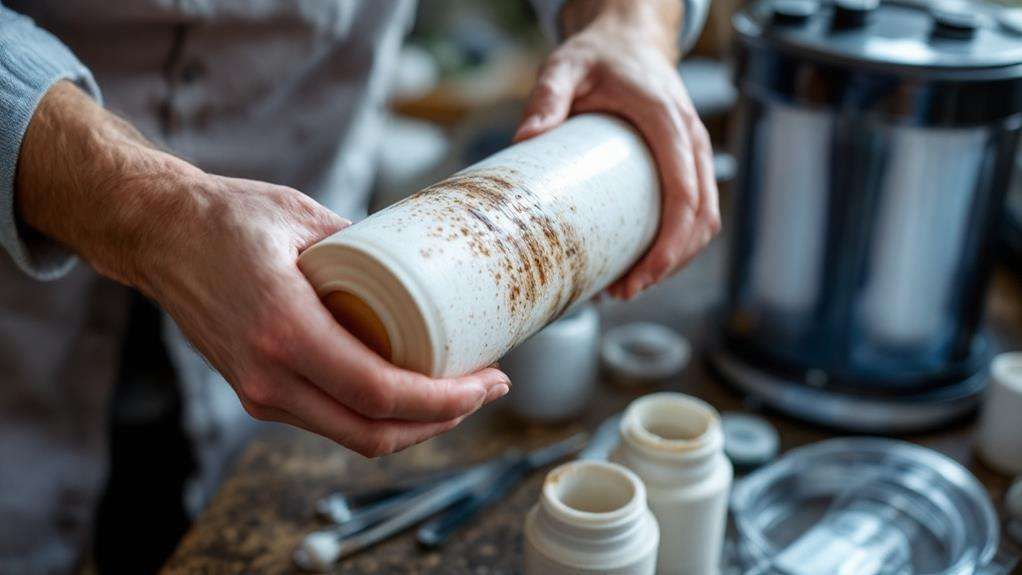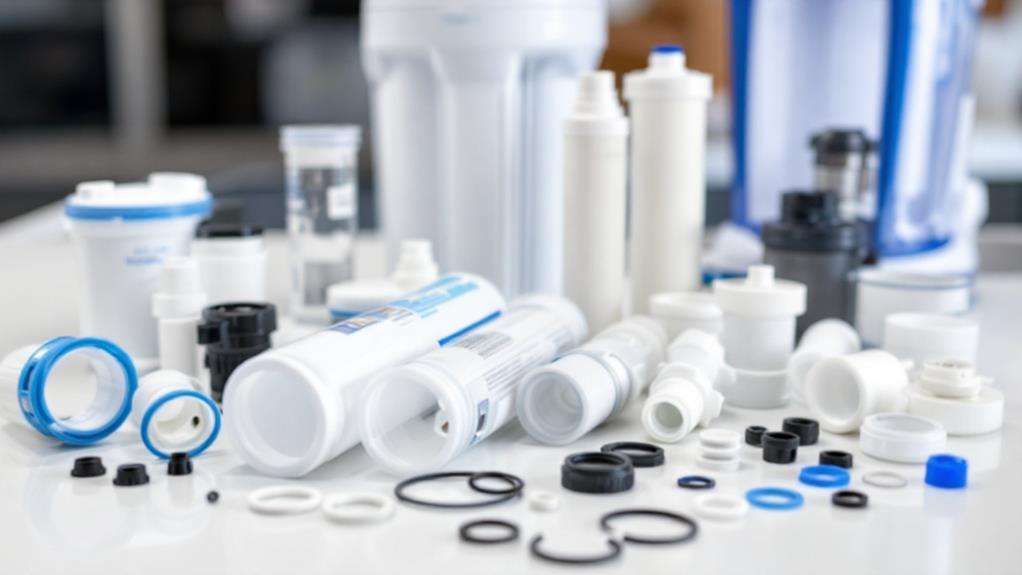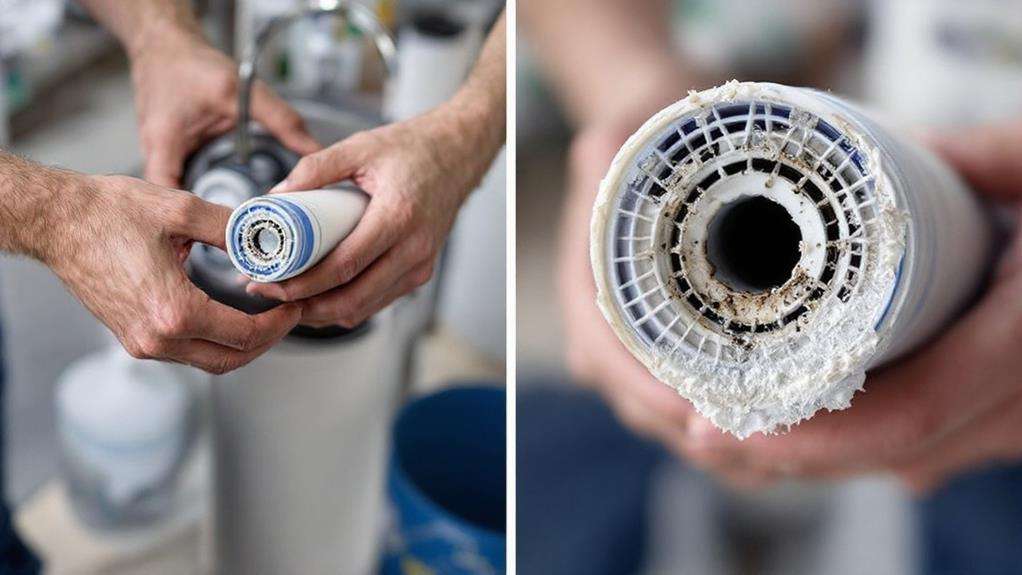How to Maintain Your Water Filtration System for Maximum Efficiency
To maintain your water filtration system for maximum efficiency, start by understanding its components and specific requirements. Clean the exterior regularly, inspect for wear, and flush the system as directed. Replace filter cartridges on schedule, and monitor water quality through regular testing. Address common issues like reduced flow rates or unusual tastes promptly. Use genuine replacement parts to ensure optimal performance and protect your warranty. Sanitize the system periodically to prevent bacterial growth, and dispose of used filters responsibly. By following these steps and staying vigilant, you'll enjoy clean, safe water and extend your system's lifespan. Plunge deeper to reveal even more maintenance secrets.
Understanding Your Water Filter System
Water filters are the unsung heroes of our homes, quietly maintaining we have clean, safe drinking water. To preserve your water filter system effectively, you need to understand its components and how it works. There are various types of water filters, including activated carbon, reverse osmosis, and UV filters. Each type has a specific function and requires different maintenance approaches.
The heart of your system is the filter cartridge, which traps contaminants as water passes through. Regular upkeep is imperative to guarantee your filter continues to provide clean water. Preventative maintenance includes periodic filter changes, cleaning of external components, and monitoring water quality. You should familiarize yourself with your system's specific requirements, as maintenance schedules can vary depending on the filter type and your water usage.
Regular Cleaning and Maintenance
Cleanliness is the key to a well-functioning water filtration system. Regular maintenance is key to ensuring your water filter continues to provide clean, safe drinking water. By performing routine checks and proper maintenance, you'll keep your water filter in top condition and identify potential issues early.
To maintain your water filtration system effectively:
- Clean the exterior and surrounding area regularly
- Inspect all components for wear or damage
- Flush the system according to manufacturer guidelines
- Monitor water pressure and flow rate
Water filtration system maintenance isn't just about cleanliness; it's about preserving the system's efficiency and longevity. Your filter cartridges are the heart of the system, and they should be replaced as recommended by the manufacturer. Don't wait until you notice a change in water quality or taste; stick to the suggested replacement schedule.
Timely Filter Replacement

Ensuring timely filter replacement is essential for maintaining your water filtration system's effectiveness. Over time, your water filter's ability to remove impurities diminishes, potentially leading to clogged filters and reduced water flow. To avoid these issues, it's paramount to replace your filter cartridge regularly.
Pay attention to signs that indicate your filter needs changing. If you notice an odd taste or strange smell in your water, it's likely time for a replacement. Additionally, keep track of your filter's lifespan as recommended by the manufacturer. Many advanced filtration systems come equipped with control units that display when it's time for a filter change.
Don't wait until you experience problems with your water quality or flow rate. Regular filter replacement, whether it's a sediment filter or carbon filter, guarantees your system continues to operate at peak efficiency. By staying proactive with your filter changes, you'll maintain clean, great-tasting water and extend the life of your filtration system. Remember, timely filter replacement is a small investment that pays off in the long run, protecting both your health and your water filtration equipment.
Monitoring Water Quality
Beyond regular filter replacements, keeping tabs on your water quality is a key aspect of maintaining your filtration system. By consistently monitoring your water's characteristics, you'll be able to identify potential issues early and ensure your system is performing in an ideal manner.
To effectively monitor your water quality and maintain your filtration system:
- Conduct regular water tests to track changes in contaminant levels
- Monitor water flow rate and pressure for signs of system issues
- Keep a detailed log of water quality metrics (pH, chlorine, TDS)
- Compare test results to manufacturer specifications
By implementing these practices, you'll gain valuable insights into your system's performance over time. Regular water testing allows you to identify when contaminant levels indicate the need for filter maintenance or replacement. Additionally, monitoring flow rate and pressure can alert you to potential problems with your filtration system.
It is essential to maintain a comprehensive log of water quality metrics, including pH, chlorine levels, and total dissolved solids. This data will help you track your system's performance and identify trends that may require attention. When interpreting test results, don't hesitate to consult a water quality professional for expert guidance on maintenance schedules and system optimization.
Addressing Common Filter Issues

While maintaining your water filtration system, you're likely to encounter some common filter issues. To keep your system running smoothly, it's essential to address these problems promptly. One frequent issue is reduced flow rate, which often indicates clogged filters. To maintain ideal performance, clean your filters regularly or replace them when necessary.
Pay attention to unusual tastes or odors in your filtered water, as these can signal that it's time to replace your filters. Make sure you're using the correct type of filter for your system and that it's installed properly. Leaks around the filter housing can occur due to worn-out O-rings or loose fittings, so inspect these components regularly and replace them as needed.
If you notice decreased water pressure, check for mineral buildup in your filters and clean them accordingly. Some systems may have a bypass valve that activates when filters are clogged; confirm this isn't engaged unnecessarily. Keep track of your filter's lifespan and replace them on schedule to maintain water quality. By addressing these common issues promptly, you'll keep your filtration system running efficiently and guarantee clean, safe water for your household.
Professional Maintenance Services
Although addressing common filter issues yourself is important, there's significant value in seeking professional maintenance services for your water filtration system. Expert technicians can perform thorough inspections, identifying potential problems before they lead to costly repairs. They'll guarantee your home water filtration system, including reverse osmosis systems, operates at peak efficiency.
Professional maintenance offers several key benefits:
- Extensive cleaning and sanitization to prevent biofilm buildup
- Proper cartridge replacement for ideal filter working
- Expert handling of delicate components to maintain water pressure
- Annual check-ups to address issues promptly
When you hire professionals for water treatment maintenance, you're investing in the longevity of your system. They'll clean and sanitize components thoroughly, preventing degradation of carbon filters and other indispensable parts. Experts can also replace cartridges with precision, ensuring proper installation and functionality.
Choosing the Right Replacement Parts

Selecting the right replacement parts is fundamental for your water filtration system's performance and longevity. When it's time to replace components, always use parts specifically designed and approved for your system. This guarantees optimal performance and compatibility, maintaining the intended functionality of your water filtration system.
Refer to the manufacturer's recommendations when choosing replacement filters, RO membranes, or other components. Match the micron rating, capacity, and other specifications to the original equipment to maintain consistent water quality. You might consider upgrading to higher-quality replacement parts with longer lifespans or enhanced filtration capabilities to improve your system's overall efficiency.
To guarantee authenticity and protect your warranty, purchase replacement parts from authorized dealers or directly from the manufacturer. This precaution helps avoid counterfeit parts that could compromise your system's performance or even void its warranty. Remember, the right replacement parts are crucial for your reverse osmosis or other water filtration system to function correctly. By following these guidelines, you'll ensure your system continues to provide clean, safe water while maximizing its lifespan and efficiency.
Sanitizing Your Filtration System
Maintaining your water filtration system goes beyond just choosing the right replacement parts. Sanitizing your system regularly is indispensable for ensuring clean, safe drinking water and optimal performance. Here's why you should prioritize sanitization:
- Eliminates harmful bacteria, algae, and microorganisms
- Maintains the effectiveness of filter media
- Prevents reduced water flow and off-flavors
- Avoids potential health risks from contaminated water
To properly sanitize your water filtration system, follow the manufacturer's instructions and use a recommended sanitizer. This process should typically be performed every 6-12 months, depending on your specific system and water quality. By sanitizing regularly, you'll help eliminate the buildup of contaminants that can accumulate over time, ensuring your system continues to deliver high-quality drinking water.
Don't underestimate the importance of this maintenance step. Failing to sanitize can lead to decreased efficiency and potentially compromised water quality. If you're unsure about the appropriate sanitization schedule or process for your system, consult a professional water treatment specialist. They can provide expert guidance custom-tailored to your specific filtration system and help you maintain its performance for years to come.
Proper Filter Disposal Methods

Once you've replaced your water filter, don't just toss the old one in the trash. Proper filter disposal is essential for maintaining environmental responsibility and complying with local regulations. Your water filtration system's used cartridges may contain contaminants that require special handling.
Check with your local waste management authority or consult the manufacturer's instructions to determine the appropriate disposal method for your specific filter. Many manufacturers offer mail-back programs, allowing you to return used filters for responsible disposal. If you're disposing of the filter yourself, seal it in a plastic bag before placing it in the trash to prevent any leakage.
Some water filtration systems have components made of recyclable materials. If possible, separate these parts and recycle them where facilities exist. This extra step can greatly reduce your environmental impact.
Optimizing System Performance
To keep your water filtration system running at its best, regular maintenance and optimization are essential. A high-quality water filtration system requires consistent care to guarantee clean, safe water for your household. By following a few key steps, you'll keep your system performing optimally and extend its lifespan.
- Clean and sanitize components regularly
- Monitor water pressure and flow rate
- Test water quality periodically
- Stay up-to-date with manufacturer recommendations
Maintenance guarantees that all components that require attention are properly cared for. You'll need to replace the filter cartridges according to the manufacturer's schedule or when you notice a decrease in water quality. Don't forget to clean and sanitize other parts of the system, such as storage tanks and dispensers.
Pay attention to your specific water needs and adjust your system accordingly. If you notice changes in your water's taste, odor, or appearance, it might be time to reassess your filtration setup. Regular testing of your water quality will help you identify any issues early on.

